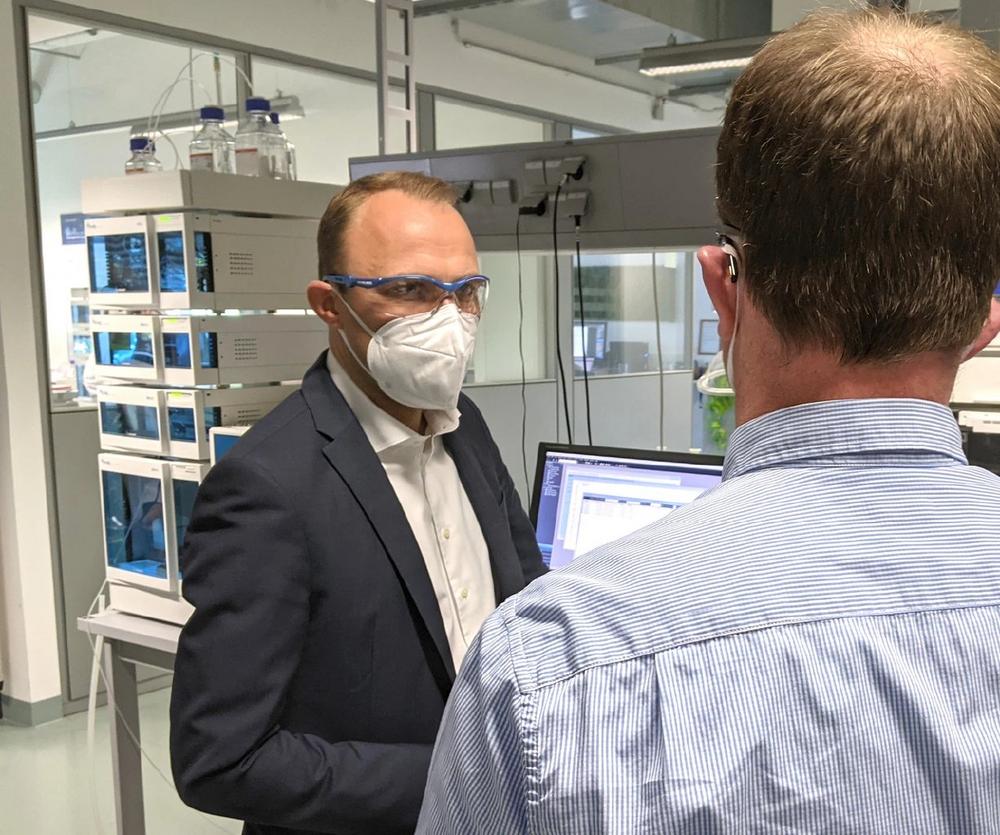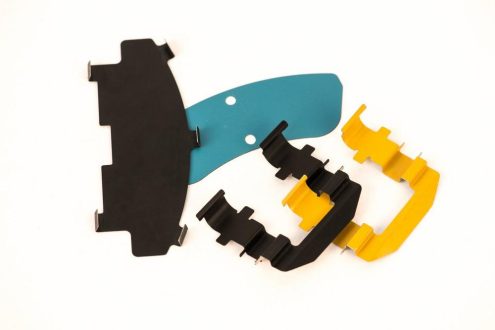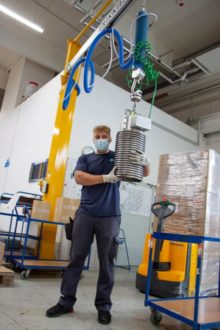
Sebastian Czaja Visits Hidden Champion KNAUER
The FDP politician, who by his own account likes to seek direct exchange with the stakeholders in Berlin’s economy, used the morning on June 2, 2021 to exchange ideas with Alexandra Knauer and Carsten Losch on important issues for the future.
KNAUER is open to discussion with many parties and so the management is pleased when politicians show interest in medium-sized companies, their impulses and experiences. In recent years, for example, a number of district politicians, politicians from the Berlin Senate and the opposition have visited the company.
During Czaja’s visit, the focus was on the future development of the metropolitan region. How can Berlin-Brandenburg be attractive for innovative companies like KNAUER in the long term? After all, the medium-sized companies in particular contribute a large part of the added value for the region – on the one hand through their own jobs, on the other hand as clients for suppliers and services, and of course through the associated tax revenue. Construction, transport and renewable energies were the focus of the talks – topics in which the company is very interested in addition to its many projects.
For many years, KNAUER has relied on its own production and regional suppliers wherever possible, primarily for reasons of sustainability and short delivery times.
"Buying locally is not the cheapest option, but it allows us to ensure that supplies are also made under environmentally sound and impeccable working conditions. During the Corona crisis, it was precisely this regional sourcing that helped us to remain able to deliver," said Managing Director and owner Alexandra Knauer.
The discussion also dealt with topics of direct importance for the small industrial area in Berlin’s southwest at Hegauer Weg: For example, the connection by public transport has not been ideal for years. A tighter schedule for the existing bus line 115 would be desirable. The fact that the FDP also supports the extension of the U3 subway line from Krumme Lanke station to Mexikoplatz pleased the management.
The company, which has 160 employees, also addressed another issue: Some vacancies are difficult to fill. For example, KNAUER is looking for mechatronics engineers, among others, and also for trainees as mechatronics engineers or chemical laboratory assistants (all m/f/d). In addition, the qualification of the trainees has become more and more time-consuming over the past few years, before they are able to learn specifically in the company. The FDP is increasingly advocating that the funds for education should preferably be spent on creating a solid school education. Berlin, on the other hand, has so far tended to be the champion in spending on post-qualification, Czaja said.
The biggest surprise for Mr. Czaja was the report of the Corona pandemic impact on the KNAUER company. The group chairman learned that with the first lockdown, everyone at KNAUER was initially very concerned about how the demand for chromatography equipment would proceed. KNAUER’s instruments allow customers to analyze food or environmental samples, for example. However, important customer groups such as university laboratories and industrial laboratories in Germany and many other countries were affected by closures, and the company was already preparing for short-time work.
In the summer of 2020, however, a customer inquiry came along that changed a lot. A well-known pharmaceutical company was looking for support in the development of a unit for the preparation of lipid nanoparticles (LNP) for vaccine production. Lipid nanoparticles provide encapsulation and protection of the sensitive mRNA in mRNA-based corona vaccines so that it can safely reach its site of action, the cell. Until then, there were only small systems for research, which could produce LNP for a few hundred vaccine doses per week. No one had yet developed and produced larger systems. The KNAUER engineers took up the challenge, since they could rely on a key component, the extremely precise KNAUER high-pressure pumps. Together with the customer, they developed the first system in record time, making it possible to produce LNP for several million doses of vaccine per week. With this success, KNAUER had become an important supplier of equipment for mRNA vaccine production.
Enabling the production of further plants and providing service for the already existing plants under pandemic conditions had top priority from now on.
"Hardly anyone knows that KNAUER made a decisive contribution to the large-scale production of corona vaccines based on mRNA at the end of 2020. That makes us very proud," says Carsten Losch, second managing director and head of international sales.
In accordance with the contract, the company is not allowed to mention the name of the customer. The Zehlendorf-based company is thus a true hidden champion in the new field of LNP pharmaceutical production.
The family-owned company KNAUER Wissenschaftliche Geräte GmbH has been developing high-tech laboratory instruments for research, routine analysis and production for 59 years. Liquid chromatography (HPLC) systems are used to analyze liquid samples for ingredients and impurities and determine their quantity. The company also manufactures larger chromatography systems, e.g. for the purification of proteins, active ingredients or other valuable substances. For laboratory equipment, the company supplies metering pumps, switching valves and detectors for high-pressure applications. Promotion of science and corporate responsibility are of great importance to the company. More about KNAUER at www.knauer.net
KNAUER Wissenschaftliche Geräte GmbH
Hegauer Weg 38
14163 Berlin
Telefon: +49 30 809727-0
Telefax: +49 30 8015010
https://www.knauer.net
Senior Manager Marketing
Telefon: +49 30 809727-43
Fax: +49 30 8015010
E-Mail: gueltzow@knauer.net
![]()




